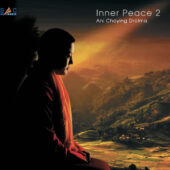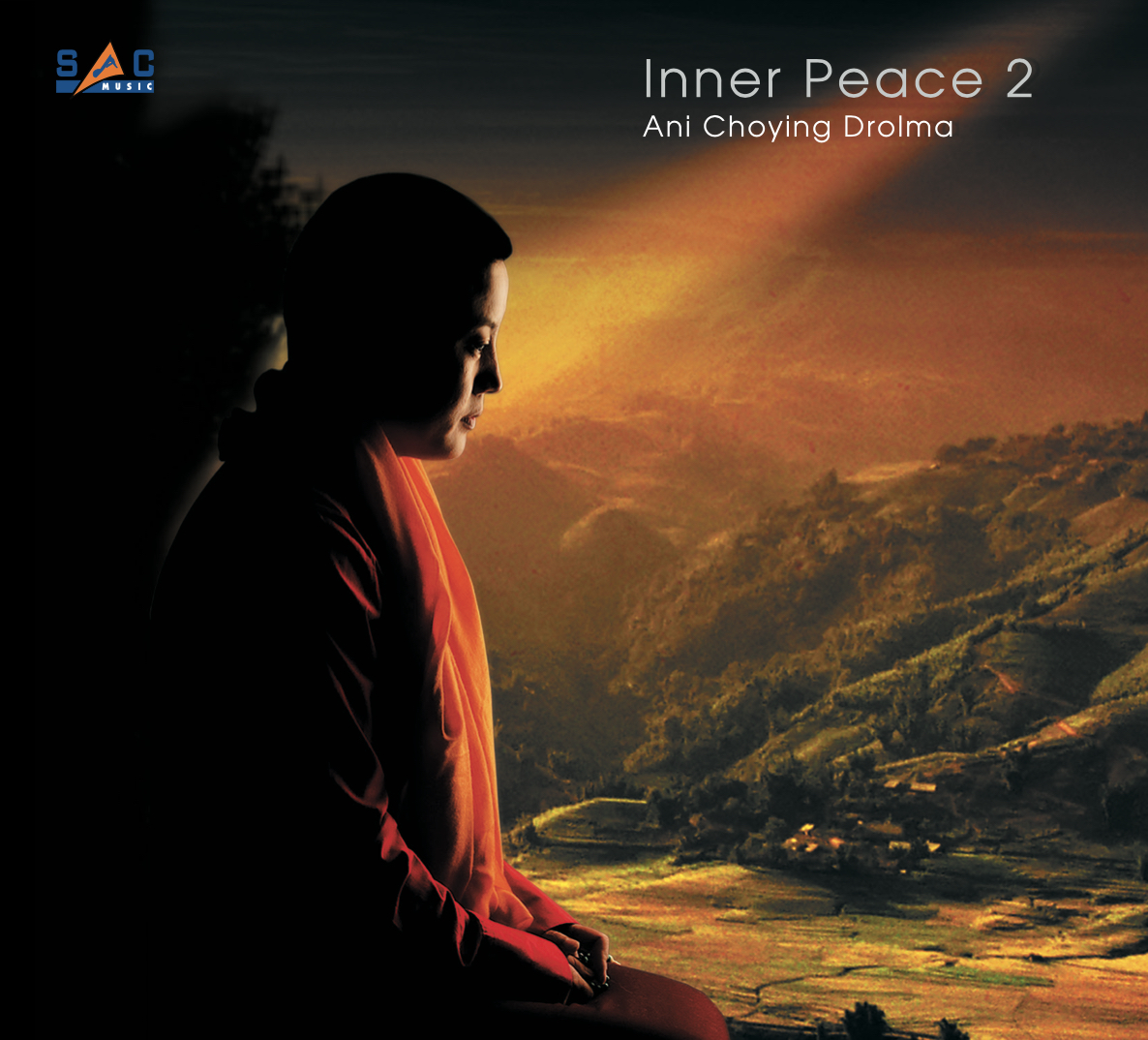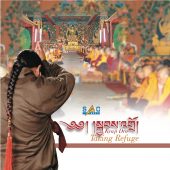Inner peace – 2
-
 play_circle_filled
play_circle_filled 01. Invocation To The Lotus-Born Master (연꽃에서 태어나신 스승님께 드리는 기도). 30s mp3
add_shopping_cart
Ani Choying Drolma -
 play_circle_filled
play_circle_filled 02. Seven-Line Prayer To The Guru Rinpoche (구루 린포체께 드리는 7행 기도). 30s mp3
add_shopping_cart
Ani Choying Drolma -
 play_circle_filled
play_circle_filled 03. Feast Song By Jigme Lingpa (지그메 링파의 축제 노래). 30s mp3
add_shopping_cart
Ani Choying Drolma -
 play_circle_filled
play_circle_filled 04. Supplication To Chokgyur Lingpa (촉귀르 링파께 드리는 기도). 30s mp3
add_shopping_cart
Ani Choying Drolma
Songs & Meanings
- INVOCATION TO THE LOTUS-BORN MASTER
Manifest, Padmakara and host dakinis!
Think of me, sugatas of the ten directions and three times.
Great Jetsun Padma Thothrentsal
Please come from the realm of vidyadharas and dakinis.
Your magnificent hair tied up in a topknot, shikseshik;
Your many jewels and adornments tinkling, silili;
Your charnel ground bone ornaments dangling, trololo;
Many sounds and instruments roaring, ururu!
Voices of the yidam deities are humming, driri;
The five dakini classes are beautifully dancing, shikseshik;
Great gingdakas are stamping the dance, trapse trap;
Mamodakinis are assembling like clouds, tripse trip.
Dharmapalas of the eight classes go about their activities, khyksekhyuk;
The sounds of the hundred subchen ring out, silili;
To the right are the male classes, sharara;
To the left are the female classes, sharara.
Banners and canopies wave in the wind;
The scent of sweet incense billows, thululu;
Secret mystic dakini words resonate, diriri;
Whistling songs of the great gingdakas trill, khururu
Many songs manifesting HUNG appear, diriri;
Wrathful sounds symbolizing PHET issue forth, sangse sang.
Look upon me and all the beings of the six realms
And come right to this place!
Until I attain the supreme enlightenment,
Please subdue all obstructions, evil guides and obstacle makers,
And bestow the supreme and common siddhis.
Liberate us from samsara, the ocean of suffering.
INVOCATION TO THE LOTUS-BORN MASTER’s MEANING;
Following the initial request, the prayer continues with a description of Guru Rinpoche, and his circle of followers. The yidam deities whose voices are humming are the many forms of personal divinity recognized within the Tibetan Buddhist tradition. Their different attributes, ornaments, gestures, facial expressions and garments represent various types of spiritual wisdom energy, such as compassion, wisdom, the power to overcome obstacles or to bring forth whatever is needed, and so on.
The five classes of dakinis refer to the five wisdoms of the Buddhas: mirror-like wisdom that sees things as they are, the wisdom of equality that recognizes that everything has the same nature–the nature of emptiness; discriminating wisdom that sees the individual characteristics of the phenomenal world; all-accomplishing wisdom that knows how to act skillfully in any situation; and finally the wisdom of the all-encompassing space of reality.
The great gingdakas and the mamodakinis are powerful male and female forces that gather and use their wrathful power to counteract and defeat negative forces, particularly when such forces keep others from carrying out positive actions. Dharmapalas and subchen are further categories of beneficial spirits assisting those seeking to bring good into the world. The mantra syllables HUNG and PHET further invigorate the favorable forces.
What are we asking Guru Rinpoche and his retinue to do? The final verse of the prayer makes this very clear: we are asking them to look upon us and all other beings of the six realms with compassion. These others include the beings in the realms of the gods, the demi gods, the animals, the agonized spirits and the hell realms, as well as all of us humans. The different realms represent the negative emotions to which beings can fall prey: pride and complacency characterize the god realms; active jealousy and competitiveness motivate the demi-gods. Animals suffer from ignorance that leads to their enslavement; the agonized spirits from a stultifying miserliness that keeps them from enjoying whatever they may have, much less sharing it with others. Beings in hell are tormented by living in a world of constant anger and hatred. We humans suffer as a result of our attachment and clinging to people and situations that we believe we need in order to fulfill ourselves and to feel content and happy.
We ask Guru Rinpoche and his retinue to think of us and to care for us, to come to where we are and guide us. Remember that we should not imagine that they come from anywhere but within our own psyches and the untapped resources of our own minds. We pray that they remain with us until we attain enlightenment, until we are fully confident of our own perfection. The supreme and common siddhis, the miraculous powers we request, are both mundane abilities such as clairvoyance, hearing across long distances, walking so fast we skim over the earth, and others; and more importantly the supreme powers of absolute selflessness and compassion, and the vast wisdom of omniscience.
*****
The following invocation to Guru Rinpoche is one of the best known prayers in the Tibetan Buddhist world. Its significance relates to guru yoga, a practice designed to deepen a student’s relationship with his or her teacher. Acknowledging that the guru’s level of enlightened wisdom and compassionate energy is greater than our own, we meditatively mingle our mind with his or hers. This deepens our understanding and experience of the crucial truth that enlightened mind, the true essence of every teacher and every deity, is within us. As living representatives of this enlightened wisdom, our teachers enable us to uncover our own Buddha natures.
This beautiful prayer,which AniChoying sings so evocatively and devotedly, is interpreted on many levels, from the outer literal meaning to the innermost profound explanation that when practiced correctly can lead to the achievement of complete and perfect enlightenment. The outer meaning presented here is derived from a text by JamgonMipham Rinpoche (1846–1912), one of the great scholars of Tibetan Buddhism in the modern era. White Lotus, his commentary on the Seven Line Prayer, was translated by the Padmakara Translation Group and published in 2007.
- SEVEN-LINE PRAYER TO GURU RINPOCHE LYRICS;
HUNG! On the northwest border of the country of Oddiyana,
In the pollen heart of the lotus,
Marvelous in the perfection of your attainment
You are known as the lotus born
And are surrounded by your circle of many dakinis.
By following in your footsteps
I pray that you will come and confer your blessings.
GURU PADMA SIDDHI HUNG!
SEVEN-LINE PRAYER TO GURU RINPOCHE’S MEANING;
White Lotus: An explanation of the seven-line prayer to Guru Padmasambhava. Padmakara Translation Group. Shambhala Publications. Boston. 2007.
The prayer begins with the syllable HUNG. Considered the seed syllable of the mind of all the Buddhas, it invokes the enlightened mind of Guru Rinpoche himself. Mahayana—Great Vehicle—Buddhism, of which Tibetan Buddhism is one path, recognizes that beyond the historical Buddha Shakyamuni, there are past, present and future Buddhas, all characterized by minds that have fully reached their enlightened potential.
The sacred land of Oddiyana is the homeland of the dakinis, and where Guru Rinpoche was born from the center of a lotus. It is thought to have been located in what is now the Swat Valley in Pakistan or nearby in eastern Afghanistan. On Oddiyana’s northwestern frontier was a sacred lake whose perfectly pure water was full of lotus blossoms. Guru Rinpoche revealed himself on the pistil of the largest and most beautiful lotus, one that grew in the center of the lake and was surrounded by an array of other blossoms, their colors symbolizing the five wisdoms mentioned above.
Tibetan Buddhists recognize Guru Rinpoche as the ultimate and unfailing protector to whom to pray with complete trust and confidence. Knowing that he is an undeceiving source of refuge, we ask to be able to free ourselves from worldly concerns and follow in his footsteps, practicing his teachings unceasingly and with irreversible faith and devotion. This is not blind faith, but faith born of study and personal experience. We ask Guru Rinpoche to come and bestow his blessings upon us, to free us from the sufferings of worldly life. Here again we must remind ourselves that we are seeking to recognize ourselves in Guru Rinpoche and Guru Rinpoche in ourselves. This is how his blessing manifests.
The invocation concludes with Guru Rinpoche’s mantra: GURU PADMA SIDDHI HUNG. GURU means the unsurpassed teacher, and PADMA is the first name of the master of Oddiyana. SIDDHI refers to the supreme and ordinary accomplishments and powers that he has achieved and that are our goal. With HUNG, we call upon the precious master, entreating him to bring forth our supreme wisdom and compassion, the two poles of enlightenment.
Thus we supplicate the great master Guru Padmasambhava, embodiment of all the Buddhas of the three times. We reveal the place and manner of his birth, the extraordinary nature of his greatness and his actual name. The fifth line mentions Guru Rinpoche’s retinue, the display of his compassion, whose activities benefit beings according to their needs. Next, the sixth line conveys how we should pray: having recognized the Guru’s qualities, we turn our hearts to him and pray with irreversible faith, yearning to become inseparable from him. Joining the seventh line with the mantra, the blessings of his compassion enter into us, our minds are blessed and we are sure to gain accomplishment.
Jigme Lingpa (1730-1798), author of the next prayer, is considered the premier poet-visionary of the Nyingma tradition of Tibetan Buddhism. The Nyingma, or “old school” is based on the teachings Guru Padmasambhava originally brought to Tibet. JigmeLingpa was a mystic and a yogi-hermit, famous for his mastery of esoteric doctrines and his visionary meditative experiences.
This prayer is a feast song offered to the guru during a ritual feast, a tsog. Such feasts traditionally follow a group practice, and are celebrated together by a master and disciples. At the conclusion of the feast,
the students offer a song to their teacher. JigmeLingpa’s is one of the best beloved feast songs of the Nyingma lineage.
- FEAST SONG BY JIGME LINGPA
On the wish-fulfilling tree of karma linked with good wishes
The youthful peacock of East India has arrived.
Turn your tail parasol to face the sacred teachings
So we youngsters can also step onto the path of freedom.
In the Queen of Spring’s chariot of merit
The melodious voice of the cuckoo bird from the jungle of South Bhutan has arrived.
With a song sweeter than the flute of celestial maidens
We receive the auspicious omen of a joyful summer season.
Vajra brothers and sisters, assembled here with harmonious karma and wishes,
Our teacher is present and has come to this Dharma gathering.
During this feast of drinking the nectar of ripening and liberation,
I have the special task of singing a joyful song.
Amidst this gathering of unchanging great bliss,
We behold the countenance of the yidam and guru even without meditation.
So let us request the siddhi of attaining the rainbow body of dharmakaya
Through the vehicle of luminous clarity, the heart essence of the mother dakinis.
FEAST SONG’s MEANING BY JIGME LINGPA;
Karma literally means action, and refers to the law of cause and effect, which dictates that every action has its result. By acting in a positive way, by knowing what kind of behavior to adopt and what to avoid, we can affect our futures. This can be illustrated by the most simple of examples: if we customarily smile at people, greeting them in a gentle and caring manner, we will be appreciated and well-liked; always scowling and grumbling will have the opposite effect. The word karma is often mistaken to mean fate, and thought to convey a static or pessimistic view, when the converse is actually the case. Buddhist doctrine is extremely positive and optimistic, believing that by taking charge of and changing our actions we can change our futures.
The tail of a peacock is frequently used in Buddhist rituals, its many circles radiating color representing the radiance of the Buddha’s wisdom. Merit is a technical term in Buddhism; one accumulates merit through worthy and beneficial action and through expanding one’s wisdom and understanding. The larger one’s accumulation of merit the swifter will one travel the path to the ultimate goal of complete and perfect enlightenment; hence merit is here likened to a chariot.
Vajra brothers and sisters are the disciples of the same teacher, and have a special bond. The nectar of ripening and liberation alludes to the life-sustaining elixir that results from proper Dharma practice. Ripening refers to the unfolding of the results of positive actions, while liberation from the ocean of worldly sorrow is considered the supreme result.
Unchanging great bliss is neither mindless happiness nor an ecstatic state, but is the condition of a mind that has overcome the sense of being at the center of the universe, of being the most important person in the world. The Buddhist practice of developing bodhicitta, the compassionate mind of enlightenment, involves a gradual process that begins with considering the well-being of others to be as important as our own, until
finally the happiness of others becomes our primary concern. Seeking to help beings in whatever way we can, with no attachment to our action, leads to a blissful feeling of openness.
Tibetan Buddhism explicates the nature of reality as three kayas, three dimensions of existence.The Dharmakaya represents the empty essence of reality, with emptiness meaning not a void, but a state of pure potentiality from which anything can arise. The other two kayas are the Sambhogakaya, representing the luminous clarity of wisdom; and the Nirmanakaya, the manifestation of unobstructed wisdom. When we request the siddhi of attaining the rainbow body of Dharmakaya we are asking for the capacity to become one with the essential nature of reality. The practice of the Great Perfection is the vehicle of luminous clarity that will bring us this power.
The final song is a supplication to the great treasure revealer, TertonChokgyurDechenLingpa (1820–1879). A treasure revealer, a terton, is a realized master with the special power to reveal teachings that Guru Padmasambhava concealed before he left Tibet. Recognizing that as times and outer conditions changed, people would need different kinds of spiritual practices, Guru Rinpoche hid his teachings in various places, including caves, steep mountain rock faces, deep lakes, and so on, and made predictions about the people who would find them and propagate the teachings in the future.
One of the greatest tertons of the 19th century, ChokgyurLingpa discovered the texts comprising the ChoklingTersar, the New Treasures of Chokling. This vast compilation of practices and teachings is the basis of a major Nyingma lineage widely practiced today, the lineage of the late TulkuUrgyen Rinpoche, AniChoying’s guru. It was from TulkuUrgyen that AniChoying learned to sing the sacred chants of the ChoklingTersar, and many of the prayers and chants she has sung over the years are from this sublime treasure. The following supplication extols ChokgyurLingpa’s supreme qualities as a master inseparable from the deities and gurus of the highest realms and asks for his blessings.
The prayer begins by reciting the names of the root deities associated with the Tersar lineage and their dwelling places. ChokgyurLingpa, here called DechenDorje–indestructible great bliss–is inseparable from them all. Amitayus is the Buddha of Long Life and Avalokiteshvara the Buddha of Compassion. Padma Vajra is a form of Lord Padmasambhava holding a vajra, a thunderbolt symbolizing the highest form of wisdom, the wisdom that instantaneously illuminates the darkness of ignorance; and Great Vajradhara is the Buddha Great Vajra holder, the lord of all Buddha families.
One’s own root guru, who resides on the crown of one’s head, is also ChokgyurLingpa. He is inseparable from the chiefs of all dakas and dakinis, and of all the protector deities who have vowed to uphold the sacred Dharma. UrgyenNorlha is an emanation of Padmasambhava as the Wealth-granting Buddha.
Bringing to mind all of these sacred manifestations and remembering their inseparability from the great TertonChokgyurLingpa, we appeal for his help so that we can accomplish our spiritual aims in this life, and for his protection in the bardo, the transitional state following death. We pray to realize our mind as Mahamudra, the great seal, the unity of emptiness and great compassion.
- SUPPLICATION TO CHOKGYUR LINGPA – LYRICS
Ema ho
In the western realm of Great Bliss
Is DharmakayaAmitayus
Inseparable from ChokgyurLingpa.
DechenDorjethink of me!
Please guide all beings connected to me,
My mothers equal to the sky,
To the realm of Great Bliss.
In the realm of Mount Potala
Is the noble and supreme one, Mighty Avalokiteshvara
Inseparable from ChokgyurLingpa.
DechenDorjethink of me!
Please guide all beings connected to me,
My mothers equal to the sky,
To the realm of Potala.
On the Glorious Copper Colored Mountain in Chamara
Is the Lord Padmasambhava
Inseparable from ChokgyurLingpa.
DechenDorjethink of me!
Please guide all beings connected to me,
My mothers equal to the sky,
To the realm of Lotus Light.
In the celestial realm of Uddiana
Is Vidyadhara Padma Vajra
Inseparable from ChokgyurLingpa.
DechenDorjethink of me!
Please guide all beings connected to me,
My mothers equal to the sky,
To the celestial realm.
In the dharmadhatu palace of Akanishtha
Is Dharmakaya Great Vajradhara
Inseparable from ChokgyurLingpa.
DechenDorjethink of me!
Please guide all beings connected to me,
My mothers equal to the sky,
To the realm of Akanishtha.
In the palace of great bliss on the crown of my head
Is my gracious root guru
Inseparable from ChokgyurLingpa.
DechenDorjethink of me!
Please guide all beings connected to me,
My mothers equal to the sky,
To the expanse of dharmadhatu.
Master of the gathering of dakas and dakinis
In the twenty-four great countries,
Inseparable from ChokgyurLingpa.
DechenDorjethink of me!
Please guide all beings connected to me,
My mothers equal to the sky,
To the pure celestial buddhafields.
In the realms of the nirmanakayas who tame beings
Is the ocean of vow holding Dharma protectors,
Inseparable from ChokgyurLingpa.
DechenDorjethink of me!
For all beings connected to me,
My mothers equal to the sky,
Please dispel negative conditions and obstacles.
In the realm of bestowing all supreme and common siddhis
Is UrgyenNorlha and consort
Inseparable from ChokgyurLingpa.
DechenDorjethink of me!
Please protect all beings connected to me,
My mothers equal to the sky,
From the fear of poverty
And bestow all the supreme and common siddhis.
In this life please help us obtain whatever we wish for
And accomplish all spiritual activities.
Later, in the fearsome bardo,
Protect us the moment we think of you.
This very moment,
Bless us to quickly realize,
Our mind to be Mahamudra,
The essence of self-arising self-liberation.
Now, in this time of degeneration,
Whatever happens, joy or sorrow, good or bad,
We rely on nobody else but you;
So please gaze upon us with your compassionate eyes.
By listening to “Inner Peace”
may your mind turn towards dharma
may dharma practice become the path
may the path clarify confusion
may confusion arise as wisdom.







